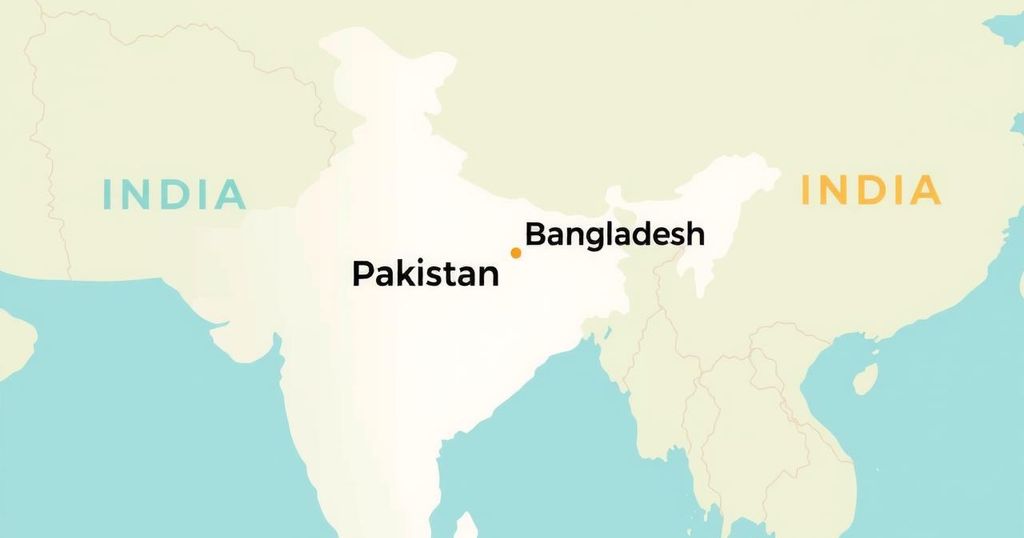Bangladesh’s relations with Pakistan are improving following political shifts, with the country importing rice from Pakistan for the first time in decades. This thaw in relations includes revived military contacts and direct trade, signaling a potential strategic alliance against India. However, historical grievances from the 1971 war, including demands for a formal apology from Pakistan, remain unresolved and could complicate future ties. The dynamics are closely monitored by India, which seeks stability in the region ahead of Bangladesh’s upcoming elections.
In light of recent political upheaval in Bangladesh, notably the ousting of Prime Minister Sheikh Hasina last year, the dynamics of Bangladesh-Pakistan relations have significantly changed. For the first time in decades, Bangladesh has begun direct trade with Pakistan, including importing 50,000 tonnes of rice, and reviving direct flights and military contacts. This shift signifies a potential thawing of relations that were historically strained, particularly after the 1971 independence war.
Historically, the animosity between Bangladesh and Pakistan traces back to the 1971 liberation struggle. Despite a cordial period from 2001 to 2006, relations soured with Hasina’s leadership from 2009, which was characterized by close ties to India and reluctance towards Islamabad. However, following Hasina’s departure, the atmosphere seems to be changing towards a normalization of ties, as highlighted by former Bangladeshi diplomat, Humayun Kabir, who perceives this as a return to “two normal neighbours.”
The developments are noteworthy, particularly from India’s perspective, which has a long and complicated relationship with Pakistan. Bangladesh’s recently frosty ties with India have contributed to the watchfulness towards its burgeoning relations with Pakistan. Experts, including Ayesha Siddiqa, suggest the renewed partnership may be strategically motivated, as both nations seek to counterbalance Indian dominance in the region.
Aside from the establishment of direct trade, notable diplomatic interactions have occurred, with interim Prime Minister Muhammad Yunus meeting several times with Pakistan’s Prime Minister Shehbaz Sharif. Additionally, military relations have intensified, evidenced by a Bangladeshi military delegation’s visit to Pakistan and the participation of the Bangladeshi navy in a multinational maritime exercise.
Veena Sikri, former Indian high commissioner to Bangladesh, warns that this military relationship poses significant security concerns for India, recalling historical instances of insurgent training supported by Pakistan within Bangladesh. Although concerns over insurgent movements remain, the Bangladeshi government has dismissed reports of ISI involvement in Dhaka and any alleged activities to revitalize insurgent groups.
Political analysts emphasize that while economic and cultural ties with India are crucial for Bangladesh, issues stemming from the 1971 war must be resolved before any full normalization can occur with Pakistan. Bangladesh demands a formal apology from Pakistan regarding war atrocities, a request to which Islamabad remains indifferent. Former Pakistani military officers also recognize these historical grievances as significant barriers to improved relations.
Despite the historical tensions, there is optimism regarding trade potential. Current bilateral trade between Bangladesh and Pakistan amounts to less than $700 million, primarily favoring Pakistan. As both sides examine trade enhancement possibilities, obstacles such as high tariffs and visa restrictions persist. Yet, experts like economist Sabrin Beg express hope that better political relationships could lead to greater economic collaboration.
In conclusion, while the thaw in Bangladesh-Pakistan relations presents new opportunities, historical wounds and strategic rivalries remain at play. As Bangladesh prepares for upcoming elections, the evolving dynamics in foreign policy could further impact regional stability, particularly concerning India’s interests in maintaining peace in its northeastern states.
In summary, the evolving relationship between Bangladesh and Pakistan marks a significant shift in the geopolitical landscape of South Asia. Recent developments, including trade and military cooperation, indicate a thawing of long-standing tensions. However, historical grievances stemming from the 1971 independence war continue to impede full normalization. As both countries navigate their new relationship, India’s role remains crucial, given its vested interests in regional stability. The future trajectory of these relations will be pivotal as Bangladesh approaches its electoral phase in the coming months.
Original Source: www.bbc.com






